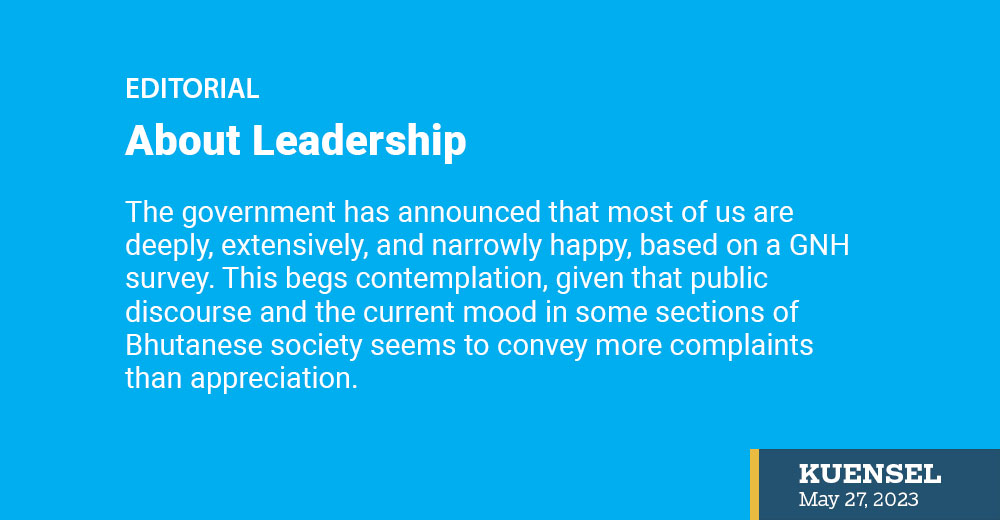The government has announced that most of us are deeply, extensively, and narrowly happy, based on a GNH survey. This begs contemplation, given that public discourse and the current mood in some sections of Bhutanese society seems to convey more complaints than appreciation.
The tone of critique, particularly on social media, indicates that we are struggling with the impact of transformation on people’s lives. Comments on government reform focus on people who are discouraged that they have not made it. The national economy is not booming, at least partially blamed on a tourism policy which aims to move away from mass tourism to a high-end approach. And many Bhutanese have family and friends trying to fulfil their dreams overseas, in countries like Australia.
It is healthy and necessary that we raise issues affecting our daily existence. But it would be more useful if we question changes with more analysis and suggestions, rather than just negativity. Constructive comments are valuable; finger-pointing does not help. We know that change, no matter how well meant, will come with some pain.
It is true that many services and systems need serious improvement. It was funny when tour operators were advising tourists 30-40 years ago to carry ear plugs because of the cacophony of stray dogs. It is not funny now with many people, including school children, being bitten. Pride in our pristine mountains has deteriorated into disappointment over the mountains of waste we see everywhere today. And it is embarrassing when we raise the SDF but those who are willing to pay are obstructed by our financial system and when visitors cannot use their credit cards to buy souvenirs.
It is also true that the government has apparently turned around a number of decisions including some relating to the tourism industry. If the SDF policy and budget hotels that contradict our high value aspirations do not work, they have to be changed. So it is good that we are questioning the methods and strategies. But, more important, have we given change enough time to work?
We claim to be a middle-income country and have decided to join WTO. We would like to hear the thinking behind these and other government decisions. We assume that policy decisions have been thought through but the relevant departments and ministries often do not explain them, leaving room for misconceptions. We would like to see government making reasoned decisions and standing by them.
Contemplating relevant questions and finding the right answers is critical as we try to grasp the complex challenges of nation building. Today, we are following a larger vision that promises to radically transform Bhutan.
We are on the eve of the National Assembly elections and, therefore, expect heightened intrigue between the politicians and voters. Creative tensions between the politicians and bureaucracy is an inevitable trait in democratic governance. The point is, will we let political pressures strengthen or destroy the management of the country?
Governance is politics and works best when politicians make decisions in the interest of the nation which goes far beyond elections. Voter pressure is a legitimate force in all democracies, but the point is we do not bow to mass pressure which could mean the lowest common denominator. We need leaders who will lead the people.


